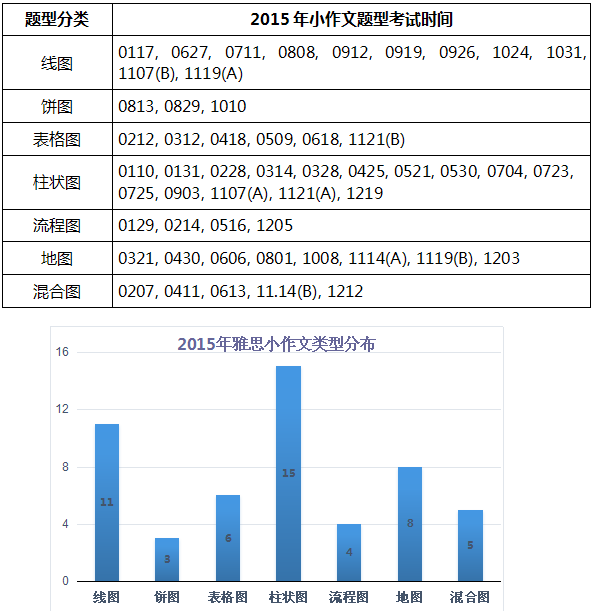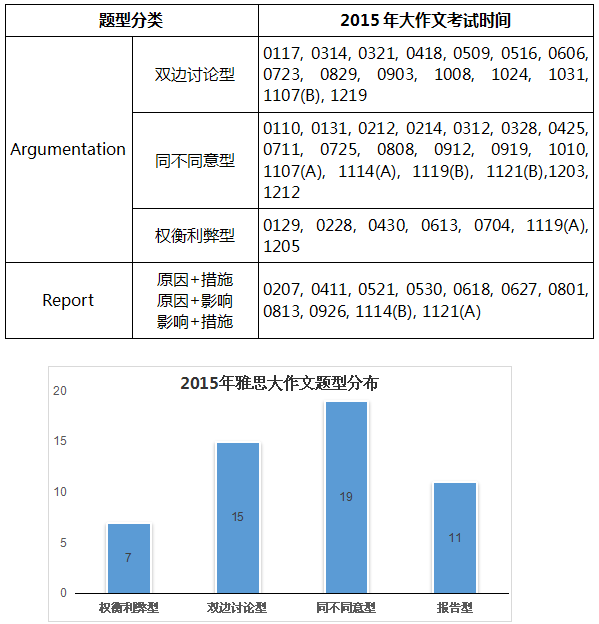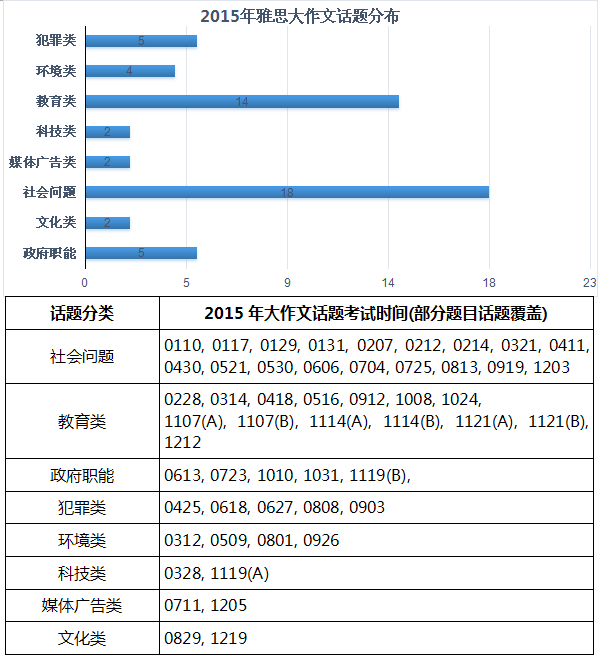隨著圣誕假期的臨近,今年全年的雅思考試也已經(jīng)全部結(jié)束,雅思考試也進(jìn)入休假期。按照慣例,中國大陸雅思考試大概每月4場,一年總共48場考試。現(xiàn)分別就TASK1和TASK2總結(jié)分析如下。由于11月份四場考試出現(xiàn)A,B卷,下圖已標(biāo)出A、B。
TASK1小作文
(一)2015年小作文題目分類總結(jié)

從2015年小作文的題目分類來看,數(shù)據(jù)類圖表(線圖、餅圖、表格圖和柱狀圖)的考核高達(dá)40次。
在數(shù)據(jù)類圖表寫作中,從題目類型分布來看,柱狀圖仍然是處于領(lǐng)跑的位置,在整年中柱狀圖出現(xiàn)了15次(動態(tài)8次,靜態(tài)7次),除了6月和8月以外,其余每月都有出現(xiàn)。其次是線圖,線性圖歷年來考察的次數(shù)比較穩(wěn)定,大概在8-12次,在去年的考試中出現(xiàn)了8次,今年上升到了11次。值得一提的是表格圖,在2014年的考試中出現(xiàn)了10次,今年卻縮減了一半,2015年表格題在上半年中僅出現(xiàn)了5次(動態(tài)3次,靜態(tài)3次)。餅圖的考核與2014年(2次)的出題量相比,基本變化不大,頻率一直都較低,2015年考核了3次(動態(tài))。混合圖的考核也有所增加,從2014年的4次上升為5次。
結(jié)合2015年雅思小作文考情回顧可看出,數(shù)據(jù)類圖表寫作的考核仍然占主導(dǎo)地位,因此這類題型也是教學(xué)和考生們備考的重點(diǎn)。此外,雅思考官仍舊執(zhí)著于考察學(xué)生對于以時間為導(dǎo)向的動態(tài)數(shù)據(jù)變化描寫的基本功力。而對于數(shù)據(jù)類圖表的寫作就是需要對其進(jìn)行分類:動態(tài)類(線圖典型特征)和靜態(tài)類(餅圖典型特征),動態(tài)強(qiáng)調(diào)趨勢變化,靜態(tài)則重在數(shù)據(jù)對比。
對于非數(shù)據(jù)類(流程圖和地圖),2015年地圖和流程圖的出題量共出現(xiàn)了12次,與2014年(共13次)相比,相差不大。其中,地圖的考核與去年相比,增加了一場。而流程圖的考核卻有一定的減少。地圖題的考核方向重在歷史變遷,需要結(jié)合題中給出的時態(tài),靈活運(yùn)用方位詞來描述地理位置以及其發(fā)生的變化。流程圖則需理解題意,按照邏輯順序來描述某事物的發(fā)展過程或工作原理。
今年的雅思小作文考試中,還出現(xiàn)了連考的現(xiàn)象(0521與0530,0723與0725,0813與0829,0912與919,1024與1031,),其中0521,0723,0813都為加試場。一般來說,雅思小作文很少在連續(xù)兩個星期的考試中使用同一題型,然而近兩年,連考情況出現(xiàn)的頻率增加。2014年連考出現(xiàn)了4次(0313與0315,0405與0412,0424與0426,1204與1206),其中0313,0424,1204為加試場。由此可知,連考情況大部分出現(xiàn)在加試場及后一場考試中。
TASK2大作文
(一)2015年大作文題型分類總結(jié)

從2015年雅思大作文在出題上,雅思大作文議論文的考核一直處于不可動搖的主要地位,而其重中之重一直是在議論文的辯證上。今年,同不同意型的議論文(即Do you agree or disagree)仍然是重頭戲,接近占據(jù)全年考試的1/3,高達(dá)19次。無論是什么樣的雅思學(xué)員,學(xué)習(xí)該類文章的框架和答題思路都迫在眉睫。
(二)2015年大作文話題分類總結(jié)

與歷年相似的是,在2015年的雅思大作文中,社會問題類的作文題目依舊占據(jù)了大半江山,緊隨其后的是教育類話題。由于這兩個話題一直都是雅思大作文的熱門話題,在明年的備考中還是要多關(guān)注這兩種類型的題目。
2015年雅思大作文的話題考核幾乎沒有出現(xiàn)太多全新的題目,從手機(jī)到網(wǎng)購,從社會發(fā)展到健康教育,從媒體到犯罪,幾乎每個話題都是之前老題換了包裝之后的作品。
例如:
The use of mobile phone is as antisocial as smoking. Smoking is banned in certain places so mobile should be banned like smoking. To what extent do you agree or disagree?(2015.2.14)
Some people think that the increasing use of computers and mobile phones for communication has had a negative effect on young people’s reading and writing skills. Do you agree or disagree?(2015.3.28)
上述題目都是和手機(jī)相關(guān)的題目,屬于科技類,常考以手機(jī)為代表,遠(yuǎn)程通訊科技對于人們的生活方式以及相互關(guān)系所帶來的變化,其中還有一類今年還沒有考到的題目是如何讓老年人更好地使用手機(jī)和網(wǎng)絡(luò)(2008.6.28和 2010.11.20)。
The leader or directors of organizations are often older people. But some people say that young people can also be a leader. To what extent do you agree or disagree? (2015.1.10)
Nowadays more and more old people who need employment have to compete for the same job with young people. What problems will be caused? What would be the solutions for it? (2015.4.11)
此類老齡化問題變得越來越明顯,這類題目也時不時被考到,希望引發(fā)學(xué)生思考。考點(diǎn)主要集中在老年人在職場以及家庭中的作用(2008.9.19),退休金(2007.8.25),老年人越來越多的利弊(2012.3.10)。
Many people believe that international tourism is negative to their countries. Why do they think so? What can be done to change the negative sides in international tourism? (2015.5.30)
International travel now sometimes make people prejudiced more than broad-minded. What are the reasons of this particular phenomenon happen and what can be done to change people’s attitude? (2015.8.13 / 2008.8.21/2010.6.26)
國際旅游屬于科技類話題。由于交通的發(fā)展,特別是以飛機(jī)為代表的新型交通方式的出現(xiàn),國際旅游也變得越來越普遍。常考題目包括 international travel 或 cheap air travel 的利弊(2008.11.20,2008.6.14和2011.4.2),以及國際旅游到底能給人們帶來什么,是偏見(2008.8.21和2010.6.26)、浪費(fèi)時間和金錢(2011.2.12)、破壞環(huán)境(2008.4.5和2006.3.25)還是開活眼界,學(xué)習(xí)文化并促進(jìn)交流。
Young people who commit serious crimes, such as a robbery or a violent attack should be punished in the same way as adults. To what extent do you agree or disagree? (2015.4.25/ 2013.11.9)
In many countries, a high proportion of criminal acts are committed by teenagers. What are the reasons? What can be done to reduce criminal rates? (2015.6.18 /2009.11.7)
Many people nowadays do not feel safe either when they are at home or go out. What are the reasons? What can we do to solve this problem? (2015.6.27)
Some people who have been in prison become good citizens later, some people think that they are the best people to talk to school students the danger of committing a crime. Do you agree or disagree? (2015.8.8)
Many people are afraid to leave their homes because of their fear of crime. Some believe that more actions should be taken to prevent crime, but others feel that little can be done. Discuss both views and give your opinion. (2015.9.3 /2012.11.3)
犯罪類話題是也是2015年的爆發(fā)題目,有傳統(tǒng)的懲罰方式(prison VS alternative ways),懲罰對象(adult criminals VS teenagers),也有新的題目出現(xiàn)(2015.8.8)。監(jiān)獄的作用不可小視:對罪犯的懲罰(punishment),對潛在罪犯的威懾(deterrent),給大眾帶來安全感(sense of safety),同時也應(yīng)該結(jié)合其他方式(education, job training, community services),這樣對于有罪犯的改造才更徹底。
此外,2015年的考題在修改以往考題的基礎(chǔ)上注重了部分細(xì)節(jié)要求。與其像以往一樣單純的問答,大作文題目很多細(xì)節(jié)方面提出了考題限制。例如,在2015年3月28日“Some people think that the increasing use of computers and mobile phones for communication has had a negative effect on young people’s reading and writing skills. Do you agree or disagree?”的考試中,題目中的限制是對于reading和writing skills的negative influence。再如,在2015年3月14日“Some working parents believe that childcare centres provide the best care to children who are too young for school, some working parents believe that other family members such as grandparents may provide the best care. Discuss both these views and give you own opinion.”的考試中,對于family members進(jìn)行了限定,such as grandparents. 對于類似的細(xì)節(jié)限定,老師在雅思寫作教學(xué)中以及考生在備考時,需尤為注意。
從總體的題目革新來看,雅思大作文在2015年沒有太多變革,而明年的考試也會墨守陳規(guī)的按照機(jī)經(jīng)題目出題,畢竟雅思的寫作已經(jīng)幾乎覆蓋了現(xiàn)在多數(shù)的話題,新的寫作考題將會在歷年舊題上加限定修飾或更加關(guān)注當(dāng)今的社會生活。因此,明年考試的考生要在每個現(xiàn)有的雅思話題上均做好至少二次練習(xí)的準(zhǔn)備,不要追求練到所有題目,但追求熟悉所有話題。
簡而言之,一個精英學(xué)生想和優(yōu)秀學(xué)生拉開差距,在簡單話題上的觀點(diǎn)和解釋要更加獨(dú)具一格。因此,也推薦考生在簡單話題的觀點(diǎn)整理上悉心準(zhǔn)備。
(文/武漢新航道雅思寫作組)
2015年度雅思考情總結(jié)相關(guān)文章推薦:







